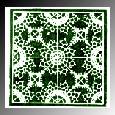
Ancient Myth in The Wild Irish Girl

Ancient Myth in The Wild Irish Girl
Sydney Owenson,
Lady Morgan does many things with her novel The Wild Irish Girl.
She uses the novel to express the ancient Irish culture as well as defend
many ancient myths as part of the Irish/Celtic history. Throughout her
novel, Sydney Owenson, Lady Morgan uses ancient mythology from around the
world. Owenson teaches her main character Horatio as well as the
reader about the rich history of the Irish people. She tells many
adventures of Ossian and other ancient heroes. Through Glorvina,
the Prince, and Father John, Horatio is exposed to many aspects of the
ancient myths and history of Ireland. The beginning of the
novel is devoted to teaching the history of Ireland and awing Horatio with
the beautiful landscape. Horatio learns through the stories told to him, that the ruins that he
is seeing is the result of his ancestors and the time when Cromwell stole
land from the Irish Catholic people. Because of the absentee land owners,
the English, the peasants of Ireland can hardly feed their families because
they do not own the land that they farm and all of the profits leave Ireland
and go to England. Even the Prince of Inismore is forced to live
in the ruins of his ancestral castle and goes to jail because he is in
debt.
Horatio learns through the stories told to him, that the ruins that he
is seeing is the result of his ancestors and the time when Cromwell stole
land from the Irish Catholic people. Because of the absentee land owners,
the English, the peasants of Ireland can hardly feed their families because
they do not own the land that they farm and all of the profits leave Ireland
and go to England. Even the Prince of Inismore is forced to live
in the ruins of his ancestral castle and goes to jail because he is in
debt.
Throughout the novel Horatio,
an Englishman, and his native Irish hosts and hostess dispute the lessons
that he is being taught. He believes what most Englishman believe,
that the book
Fingal, an Ancient Epic Poem, in Six Books by James Macpherson
was a faithful translation of an early Scottish epic by Ossian. Others
like the three native Irishmen, in this novel, believe that Macpherson
made up his some of the adventures he rights about and created support
for his claims that these stories were part of Scottish history.
Glorvina, the Prince, and Father John continually show how these stories,
that they were telling Horatio, as actually being old Gaelic myths and
stories and not part of the Scottish tradition.
Also throughout the novel, Owenson
would compare the ancient myths and gods and goddess those of the ancient
Greeks. Many of the footnotes in the novel relate a myth of the Irish
tradition to a similar tale in the old Greek and Roman traditions.
The ancient Greek civilization is represented as very similar to the ancient
Irish civilization. Father John, Glorvina, and the Prince emphasize the
strength and knowledge of their ancient ancestors. Horatio is skeptical
to believe their claims, because he has been conditioned to think that
the Irish people are weak, lazy, and not very smart. When Horatio
was in Ireland he saw the bad living conditions and the peasants that could
not feed themselves, so he had trouble believing that Ireland was once
a great civilization like the ancient Greeks. The English, in general,
thought very poorly of the Irish. They did not believe that they
could governed themselves. Most English looked down on all Irish
people even the royalty and upperclasses of Ireland.